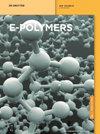不同比例CNTs/Fe3O4复合填料对聚乳酸纳米复合材料形态、电学和电磁干扰屏蔽性能的影响
IF 3.3
3区 化学
Q2 POLYMER SCIENCE
引用次数: 5
摘要
摘要由于石油资源短缺,聚乳酸(PLA)作为一种可生物降解的聚合物,被广泛认为是传统石油基聚合物的替代品。因此,多功能PLA复合材料越来越受欢迎。在本研究中,将导电碳纳米管(CNTs)和磁性纳米Fe3O4填料与PLA熔融共混。通过调节碳纳米管与纳米Fe3O4的比例,详细研究了碳纳米管和纳米Fe3O4的组成对PLA纳米复合材料电干扰和电磁干扰(EMI)屏蔽性能的影响。当混合填料含量固定在10 电导率结果表明,单CNT的加入可以有效地提高纳米复合材料的电导率,而纳米Fe3O4的贡献几乎没有。适当比例的电磁混合填料可以在EMI屏蔽性能方面产生优异的协同效应。以50:50的比例含有CNTs和纳米Fe3O4的纳米复合材料表现出优异的导电性(90.6 S·m−1)和EMI屏蔽效果(EMI SE~40.5 dB)。这主要是因为CNT提供了良好的导电性,但磁性纳米Fe3O4的添加提供了由其介电和磁性引起的额外的界面极化和涡电流损失。这些特性协同导致复合材料的阻抗失配、介电损耗和极化弛豫,提高了对电磁波的屏蔽性能。此外,发现改变电磁混合填料的比例也会影响电磁波吸收。当CNT与纳米-Fe3O4的比例为25:75时,纳米复合材料的EMI SE为24.6 dB,吸收率可达最大值(40.3%)。因此,本研究为构建电磁杂化填料网络制备多功能聚合物纳米复合材料提供了有价值的参考。本文章由计算机程序翻译,如有差异,请以英文原文为准。
Effect of different proportions of CNTs/Fe3O4 hybrid filler on the morphological, electrical and electromagnetic interference shielding properties of poly(lactic acid) nanocomposites
Abstract Due to the shortage of petroleum resources, poly(lactic acid) (PLA), a biodegradable polymer, has been widely considered as a replacement for traditional petroleum-based polymers. Therefore, multifunctional PLA composites have become increasingly popular. In this study, conductive carbon nanotubes (CNTs) and magnetic nano-Fe3O4 fillers were melt-blended with PLA. The impact of CNTs and nano-Fe3O4 composition on the electrical and electromagnetic interference (EMI) shielding properties of PLA nanocomposites was investigated in detail by adjusting the CNTs-to-nano-Fe3O4 ratio. When the hybrid filler content was fixed at 10 wt%, the electrical conductivity results indicated that the addition of single CNTs could effectively improve the conductivity of the nanocomposites, while nano-Fe3O4 contribution was hardly noted. A suitable ratio of electromagnetic hybrid fillers can yield excellent synergistic effects in EMI shielding properties. The nanocomposites containing CNTs and nano-Fe3O4 in a 50:50 ratio exhibited excellent electrical conductivity (90.6 S·m−1) and EMI shielding effectiveness (EMI SE ∼ 40.5 dB). This is primarily because CNTs provide good electrical conductivity, but the addition of magnetic nano-Fe3O4 provides additional interfacial polarization and eddy current losses caused by its dielectric and magnetic properties. These properties synergistically result in an impedance mismatch, dielectric loss, and polarization relaxation of the composite materials, improving the shielding properties against electromagnetic waves. Further, it was found that changing the ratio of electromagnetic hybrid fillers also affected electromagnetic wave absorption. When the ratio of CNT-to-nano-Fe3O4 was 25:75, the nanocomposites had an EMI SE of 24.6 dB, and the absorptivity could reach the maximum (40.3%). Thus, this study provides a valuable reference for preparing multifunctional polymer nanocomposites by constructing electromagnetic hybrid filler networks.
求助全文
通过发布文献求助,成功后即可免费获取论文全文。
去求助
来源期刊

e-Polymers
化学-高分子科学
CiteScore
5.90
自引率
10.80%
发文量
64
审稿时长
6.4 months
期刊介绍:
e-Polymers is a strictly peer-reviewed scientific journal. The aim of e-Polymers is to publish pure and applied polymer-science-related original research articles, reviews, and feature articles. It includes synthetic methodologies, characterization, and processing techniques for polymer materials. Reports on interdisciplinary polymer science and on applications of polymers in all areas are welcome.
The present Editors-in-Chief would like to thank the authors, the reviewers, the editorial staff, the advisory board, and the supporting organization that made e-Polymers a successful and sustainable scientific journal of the polymer community. The Editors of e-Polymers feel very much engaged to provide best publishing services at the highest possible level.
 求助内容:
求助内容: 应助结果提醒方式:
应助结果提醒方式:


